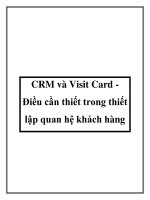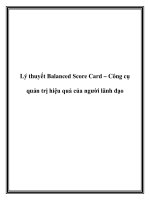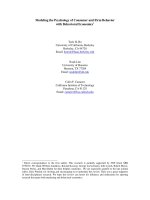psychology parenitng flash card
Bạn đang xem bản rút gọn của tài liệu. Xem và tải ngay bản đầy đủ của tài liệu tại đây (200.65 KB, 39 trang )
The Psychology of
Parenting flash Card
By Coach Weng
imcoachweng
imcoach_weng
Socialisation :
way of human to express the power of language that we have .
Internalisation :
the experience of society which we get during socialisation, are used and
become part of the individual’s practices.
Intentional socialisation :
happens when parents or other adults consciously educate certain beliefs,
principles or ideals to the child .
Unintentional socialisation:
the outcome of watching others establish connections.
Bronfenbrenner’s bio-ecological theory :
suggested four stages, which are the microsystem, the mesosystem, the
exosystem and the macrosystem. In each of these stages, connections and
interrelations occur to produce configurations that influence the development of a
child.
Microsystems:
the most fundamental stage that we are exposed to.
Mesosystems :
the association or relationship between two microsystems or maybe more .
Exosystem :
the environment in which the child is not directly involved , but is affecting a child's
development.
Macrosystem:
This stage represents the “society” or the smaller culture or population the child
lives in
Committed compliance:
the willingness of the children to follow directions given by their mothers to tidy up
their toys and not to touch the “forbidden” toys without having to remind them or
after having accidentally committed the offence.
Situational compliance :
happens when children have to be encouraged or prompted to follow given
directions and will follow only when constantly and closely monitored by their
mothers .
Self-concept :
how a person sees themself as being uniquely different from others.
Trust vs Mistrust (Birth to Age 1) :
As early as birth, babies gradually learn to possess trust in their own abilities and
also trust in the people around them.
Autonomy vs Shame and Doubt (Age 2 to 3) :
As children mature in terms of thought and bodily functions, they will begin
to accomplish tasks independently.
Initiative vs Guilt (Age 3 to 5) :
Taking the initiative when embarking on any pursuit accompanies, this stage
of development as children are able to convey their thoughts and interests,
and to use their imagination.
Industry vs Inferiority (Age 6 to Puberty) :
Schooling children are gradually grasping the importance of doing
what parents and teachers tell them to do, and receive praise and
acknowledgment for their hard work.
Identity vs Identity Diffusion (Puberty to Age
18+) :
At the onset of puberty, a period of rebellion and turbulence will take place.
Adolescents begin to raise issues regarding principles, values, beliefs and
viewpoints that they have strongly held in the past.
Intimacy vs Isolation (Age 18+ to Middle
Adulthood) :
When a person’s identity has been effectively determined, thye will begin to make
social connections with others, or intimacy, by making friends or being intimate
with another person.
Generativity vs Self-Absorption (Middle to Late
Adulthood) :
At this stage of developmentv, the children which is now an adult ,will have the
responsibility to assist the younger generation by providing them with guidance
and support ,this process is called generativity .
Integrity vs Despair (Late Adulthood to Death) :
By late adulthood, one would have already possessed an identity, have shared
intimacy with other people and have provided guidance for future generations.
Reinforcement :
Reinforcement is given for an action or behaviour in any forms such as physical
products or positive praise in making the action or behaviour happen again.
Shaping:
A series of reinforcements that are methodical and awarded instantly to the doer
for having produced almost identical moves one after another of the behaviours to
be shaped.
Extinction :
To make a particular behaviour extinct, the unfavorable reaction is disregarded or
“ignored” .
Timeout :
the child who committed an offence will be isolated for a while in another place to
make the child think about their mistakes and deal with their emotions.









